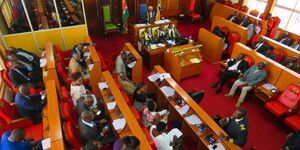On Saturday, the Ministry of Education shocked the sector with a directive mandating all students attending national high schools to pay school fees through eCitizen.
At the time, the state explained that the directive was in line with President William Ruto's plan to consolidate state payments through a single pay bill number, 222,222.
The new directive, therefore, is expected to protect the school fees from corrupt teachers and accountants long accused of creating imbalances on the institution's balance sheets.
To that end, Basic Education Principal Secretary Belio Kipsang instructed principals to provide bank names and bank accounts for their respective institutions.
"The directorate of e-Citizen in partnership with the Information Communication Technology Authority (ICTA), Ministry of Information, Communication and the Digital Economy and the National Treasury have been coordinating the onboarding of all government services onto the eCitizen platform to enhance service delivery," the circular read in part.
Whereas the specific portal for fee payment is yet to be updated on eCitizen, Kenyans.co.ke explores must-have requirements for parents trying to foot the bill.
First, parents or guardians must possess a National Identification card and a Kenya Revenue Authority (KRA) Personal Identification Number (PIN) certificate crucial for creating the eCitizen account.
Once in, the parents can toggle across the 5,000 services available online to a specific portal through which the fees must be paid.
To complete the payment, the payers must provide the student's name, admission number, and recipient school's bank account details.
In the circular, the Ministry of Education had directed principals to provide their school's bank account name, account number, branch, and branch code.
"There is no national school that accepts cash and the way you go to the bank to pay school fees is the same way you will go to eCitizen," stated Ambrose Weda, a lawyer and parent.
"When you go into your account, you will find a portal for fees, open it, give the name of the child and pay the money."
The directive, which only pilots national schools for now, caused unease among principals and parents some of whom complained that needy parents who pay school fees in kind will be most disadvantaged.
Kathiani MP Robert Mbui observed that some parents who offered free services or foodstuffs in exchange for fees would suffer the most. He also foresaw a financial crisis in the institution due to the government's storied delay in financing schools.
Former Kenya National Union of Teachers (KNUT) Secretary General Wilson Sossion concurred with the view stating that parents and guardians were yet to get proper information.
"The move by the government ordering national schools to collect fees via e-citizen has not been explained to the public and parents. However, it is a mandatory requirement, and this policy will eliminate corruption through cash payments," he explained.












